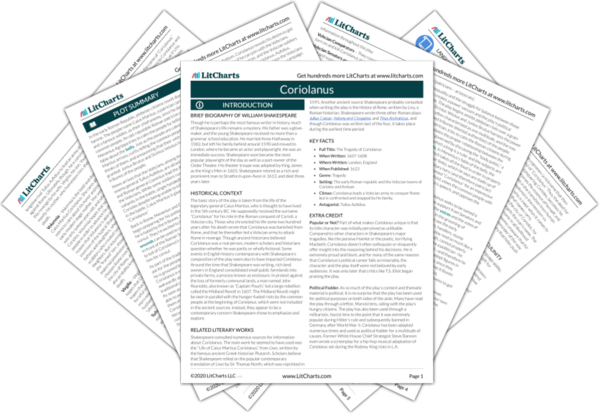Cominius Quotes in Coriolanus
I shall lack voice. The deeds of Coriolanus
Should not be uttered feebly.
…
At sixteen years,
When Tarquin made a head for Rome, he fought
Beyond the mark of others. Our then dictator,
Whom with all praise I point at, saw him fight
When with his Amazonian chin he drove
The bristled lips before him. He bestrid
An o’erpressed Roman and i’ th’ Consul’s view
Slew three opposers. Tarquin’s self he met
And struck him on his knee. In that day’s feats,
When he might act the woman in the scene,
He proved best man i’ th’ field and for his meed
Was brow-bound with the oak. His pupil age
Man-entered thus, he waxèd like a sea,
And in the brunt of seventeen battles since
He lurched all swords of the garland.

Unlock explanations and citation info for this and every other Coriolanus quote.
Plus so much more...
Get LitCharts A+Before and in Corioles, let me say,
I cannot speak him home. He stopped the flyers
And by his rare example made the coward
Turn terror into sport. As weeds before
A vessel under sail, so men obeyed
And fell below his stem. His sword, Death’s stamp,
Where it did mark, it took; from face to foot
He was a thing of blood, whose every motion
Was timed with dying cries. Alone he entered
The mortal gate o’ th’ city, which he painted
With shunless destiny; aidless came off
And with a sudden reinforcement struck
Corioles like a planet.
He is their god; he leads them like a thing
Made by some other deity than Nature,
That shapes man better; and they follow him
Against us brats with no less confidence
Than boys pursuing summer butterflies
Or butchers killing flies.
Yet one time he did call me by my name.
I urged our old acquaintance, and the drops
That we have bled together. “Coriolanus”
He would not answer to, forbade all names.
He was a kind of nothing, titleless,
Till he had forged himself a name o’ th’ fire
Of burning Rome.

Cominius Quotes in Coriolanus
I shall lack voice. The deeds of Coriolanus
Should not be uttered feebly.
…
At sixteen years,
When Tarquin made a head for Rome, he fought
Beyond the mark of others. Our then dictator,
Whom with all praise I point at, saw him fight
When with his Amazonian chin he drove
The bristled lips before him. He bestrid
An o’erpressed Roman and i’ th’ Consul’s view
Slew three opposers. Tarquin’s self he met
And struck him on his knee. In that day’s feats,
When he might act the woman in the scene,
He proved best man i’ th’ field and for his meed
Was brow-bound with the oak. His pupil age
Man-entered thus, he waxèd like a sea,
And in the brunt of seventeen battles since
He lurched all swords of the garland.

Unlock explanations and citation info for this and every other Coriolanus quote.
Plus so much more...
Get LitCharts A+Before and in Corioles, let me say,
I cannot speak him home. He stopped the flyers
And by his rare example made the coward
Turn terror into sport. As weeds before
A vessel under sail, so men obeyed
And fell below his stem. His sword, Death’s stamp,
Where it did mark, it took; from face to foot
He was a thing of blood, whose every motion
Was timed with dying cries. Alone he entered
The mortal gate o’ th’ city, which he painted
With shunless destiny; aidless came off
And with a sudden reinforcement struck
Corioles like a planet.
He is their god; he leads them like a thing
Made by some other deity than Nature,
That shapes man better; and they follow him
Against us brats with no less confidence
Than boys pursuing summer butterflies
Or butchers killing flies.
Yet one time he did call me by my name.
I urged our old acquaintance, and the drops
That we have bled together. “Coriolanus”
He would not answer to, forbade all names.
He was a kind of nothing, titleless,
Till he had forged himself a name o’ th’ fire
Of burning Rome.











